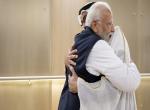The general elections for the National Majlis (Parliament) of Maldives were conducted on 22nd April. According to the results, the Peoples National Congress (PNC) of President Mohammed Muizzu and its poll partner Progressive Party of Maldives (PPM) returned with a thumping majority of 70 seats out of the total strength of 93. 368 candidates had tried to win the confidence of around 2,85,000 voters. The other major party, MDP (Maldives Democratic Party), which enjoyed a majority of 65 members in the outgoing majlis, could muster only 15 seats. Thus, President Muizzu now has a strong hand to run the country for around five years unless he faces a challenge within his own party.
Many analysts may term this landslide victory of Mohammed Muizzu as the endorsement of his ‘anti-India’ policy by the voters of the archipelago nation. True, that he began his election campaign for presidency on the rhetoric of ‘India out’ (as was expected from his party) and continued throughout the campaign for the parliamentary elections (albeit later in a subdued tone) and made his demand of removal of a tiny contingent of 80 plus Indian soldiers stationed in Maldives a plank for his election campaign. The Indian soldiers were stationed there for rescue operations and training Maldivian Defence Force personnel for operation of three Indian aircrafts given to the latter. But one cannot infer that the main factor of his party’s victory in Majlis was his ‘anti- India’ approach. The Maldivian voters, reeling under the diminishing employment opportunities and rising inflation, were not amused by the intra-party squabbles and immature manoeuvres made by the opposition to vilify the President and his party. While Abdulla Yameen, Muizzu’s mentor and a former president, left PNC to form a new party, some other prominent leaders in the party were also not very happy with the current president. Moreover, within PNC, it seems Muizzu and Yameen were in a competition to prove who is more of an ‘Islamic nationalist” than the other. But the main reason was the discontent of the voters over the happenings in the Majlis which was fully encashed by the PNC to its advantage. The way Speaker of the Majlis tried to misinterpret the constitution and got a bill passed to exclude the seats vacated by the members of the Presidential cabinet (six in the current case, as a member of Majlis must resign if he or she is appointed to the cabinet) while counting the number of members for majority purposes. Striking down of this bill by the Maldivian High Court as ‘unconstitutional’ also did not augur well with the voters. They saw it as a conspiracy to impeach the president on the grounds yet not verified beyond doubt. Moreover, even two days before the Majlis elections, the outgoing house mustered to pass an ‘anti-defection’ law in a hurry.
Before we analyse the options India has in this situation, let us try to find out what and how sound options does Muizzu have? As expected, he started his foreign tour with a trip to Türkiye instead of visiting his northern neighbour first as per prevailing tradition in Maldives. This he did under the slogan that the Maldives must not be dependent on a single source of supply of staple food to Maldives from a ‘particular country’. Under the agreements signed during the visit, Türkiye would supply rice, flour and sugar to Maldives for its requirement for a year to begin with. Türkiye has also agreed to supply unspecified number of drones to Maldives for air surveillance. This certainly displays the attempts of a middle power like Türkiye to make inroads in the Indian Ocean region to the discomfiture of India, but it was not at all an unexpected development given Türkiye’s previous attempts to meddle not only in the region but also in Kashmir, an internal affair for India. Though Muizzu met PM Narendra Modi on the sidelines of COP 28 summit, nothing concrete was discussed between the two leaders. Muizzu’s next visit to China resulted in both countries getting a new status of ‘Comprehensive Strategic Cooperation Partners’. Twenty agreements were also signed between China and Maldives on the sectors ranging from tourism, disaster risk reduction, blue economy, digital economy, BRI, training in multiple areas and restructuring of Chinese debt over the island nation. China also reportedly pledged to extend a grant of $13 million to Maldives. It may be noted here that the debt owned by China is estimated to be US $ 1.3 billion, almost 42% of the total external debt of US $ 3.577 billion of Maldives.
However, Maldives must understand that bringing extra-regional powers into the Indian Ocean region will not only de-stabilise the regional security and peace, but it is also fraught with the danger of Maldives becoming economic slave to China leading to internal discontent as we are already witnessing in Pakistan and Sri Lanka. China-Maldives trade statistics bear this out. Out of the total bilateral trade of $ 451.20 million last year, Maldives’ exports to China had been a paltry $ 60,000. In comparison, Maldives’ trade relations with India have been much healthier as will be clear from the fact that last year Maldives’ exports to India stood at US$ 8,98,000 out of the total bilateral trade of $ 341 million. Perhaps this realisation is dawning upon Muizzu who exhibited the softening of his approach to India. During the first interview given to a local channel “Mihaaru” after his assumption of power, he pleaded with India to be more lenient on the issue of repayment of Indian loan to the island nation. It is to be noted that US $ 400.9 million is due for repayment by the Maldives to India by the end of the year, an amount very difficult to pay for a country with a GDP of just $ 6.190 bn. This itself amply demonstrates that the reality is much different from the diatribes made by the PNC against India during the election campaign. A politician may say things to public in order to project his/her party as the only well-wisher of the public, but when in power, ground reality and the options available may be different. Irrespective of the growing influence of China in Maldives, India remains the net security provider (due to its huge coastline and powerful navy) and first responder as has been experienced by Maldives during the 1988 coup attempt, 2004 Sunami, 2010 water crisis or the recent Covid pandemic. Maldives is also a part of our SAGAR (Security and Growth for All in the Region) doctrine.
What should India do in the current situation? Many analysts are of the view that we should be strict with Maldives by slashing the aid, terminating the ongoing projects there and reducing the diplomatic relations. Though after the caustic remark made on Modi by three junior ministers of the island nation, there was a vilifying campaign against Maldives and calls for boycott of Maldivian tourism which resulted in sharp decline in Maldives-bound Indian tourists. But who lost out in such a situation? Though the number of Indians going there was significantly reduced, it was compensated by the increase in the tourists going from other countries. So, Maldives did not suffer much on this account. On the other hand, for many Indian tourists, Maldives became out of bounds without an alternative as Lakshadweep is yet to be achieve its full potential as a tourist destination. This episode should not have been blown out of proportion as the erring Maldivian ministers were sacked and MATATO (the Maldives Association of Travel Agents and Tour Operators) have amply apologised for the remarks in question. Wisely, the Indian Government played it low. Despite the commotion on social media and the attempt of the opposition to extract some mileage by fanning the anti-Maldives sentiments, the GOI increased the package for Maldives from Rs. 400 million in BE 2023-24 to Rs. 600 million in BE 2024-25. The critics declaring the failure of our foreign policy to Maldives must realise that, instead of accepting the terms of friendship dictated by the big powers and giant neighbours, these tiny but strategically located nations now are in position to bargain a better deal from their bigger partners. In any case, foreign policy of any country is a continuously evolving process with the refinement of the tools that conduct it. Nothing remains permanent in diplomacy. We had an excellent relationship with the last Government of Maldives which we may again enjoy after 2028 when a new government comes to power there.
In conclusion, we must not deviate from our “Neighbours First” policy and keep on the path of assisting them by addressing their concerns arising out of ‘big brother syndrome’ as long as they too recognise our importance in the region. It requires a lot of patience to build up relations and even more caution to keep it intact.
(The paper is the author’s individual scholastic articulation. The author certifies that the article/paper is original in content, unpublished and it has not been submitted for publication/web upload elsewhere, and that the facts and figures quoted are duly referenced, as needed, and are believed to be correct). (The paper does not necessarily represent the organisational stance... More >>
Image Source: https://dhiyares-spaces.sgp1.digitaloceanspaces.com/content/media/big_PSkLizlkWlK8T8iTeyAWdHF4e.JPG




.jpeg)




Post new comment